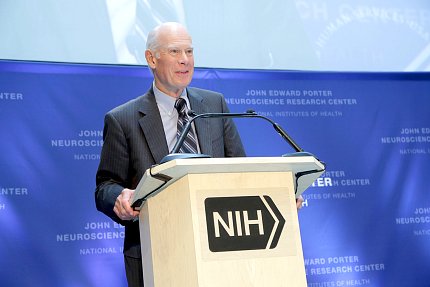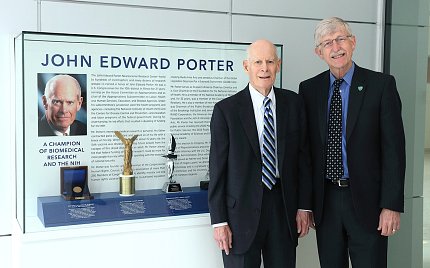‘No Better Champion’
NIH Mourns Porter, Longtime Friend of Medical Research

Photo: Ernie Branson
“There is no better champion for medical research than John Porter.” When then-NIAMS director Dr. Stephen Katz made that observation in 2011, legendary legislator Porter had been retired from Congress for a decade already. However, he’d never paused his efforts to increase support for NIH and for the medical research enterprise at large.
Porter died on June 3 at age 87.
For 21 years, the Republican represented the North Shore of Chicago, northwest suburbs and eastern Lake County of Illinois in the U.S. House of Representatives, serving the 10th district from January 1980 until retiring in January 2001.
He was a member of the House Appropriations Committee and chaired its Subcommittee on Labor, Health and Human Services, Education and Related Agencies. The committee had jurisdiction over all of NIH’s health programs, as well as those of other health-related federal agencies.
Over the period of 1998 to 2003, Congress doubled the NIH budget. Porter was widely recognized as the lead architect of that “remarkable legislative achievement,” said NIH acting director Dr. Lawrence Tabak, addressing the Advisory Committee to the Director on June 9. “Mr. Porter was one of the greatest champions of NIH in the history of the agency. NIH has lost one of our most stalwart heroes.”

Photo: Ernie Branson
Congressman Porter’s numerous achievements as a visionary public servant cemented his legacy. Under his leadership, influence and advocacy, the educational and health-related programs of federal agencies such as NIH flourished.
In addition, Porter’s commitment to the health and well-being of American citizens continued well after he left Congress. He chaired Research!America and served as vice chair of the Foundation for the NIH. He was a member of the Institute of Medicine of the National Academy of Sciences and the boards of the RAND Corporation and the American Heart Association.
Porter received 10 honorary degrees and more than 275 awards, including the Mary Woodard Lasker Award for Public Service in 2000.
In January 2014, the National Academy of Sciences honored Porter with its esteemed Public Welfare Medal, “for being a tireless and effective advocate for scientific research over more than three decades, first in Congress and then in private life, thereby helping to maintain the preeminent status of biomedical research in the United States.”

Photo: Chia-Chi Charlie Chang
Later that spring, NIH hosted a scientific symposium and a dedication ceremony to celebrate completion of the John Edward Porter Neuroscience Research Center (PNRC) on the main Bethesda campus. The 500,000-square-foot, state-of-the-art complex had been built in 2 phases and brought together 800 neuroscientists from 10 institutes and centers across NIH in an effort to spur new advances in understanding the nervous system in health and disease. PNRC’s footprint nearly matched that of its namesake.
In prescient remarks at the time, Porter called on investigators to defend research to the public and announced plans for a national campaign to reach all Americans about the importance of science.
“Each one of us has to be involved,” he said. “Let’s work together to put science and research at our country’s highest priority. Now is the time to do it!”
